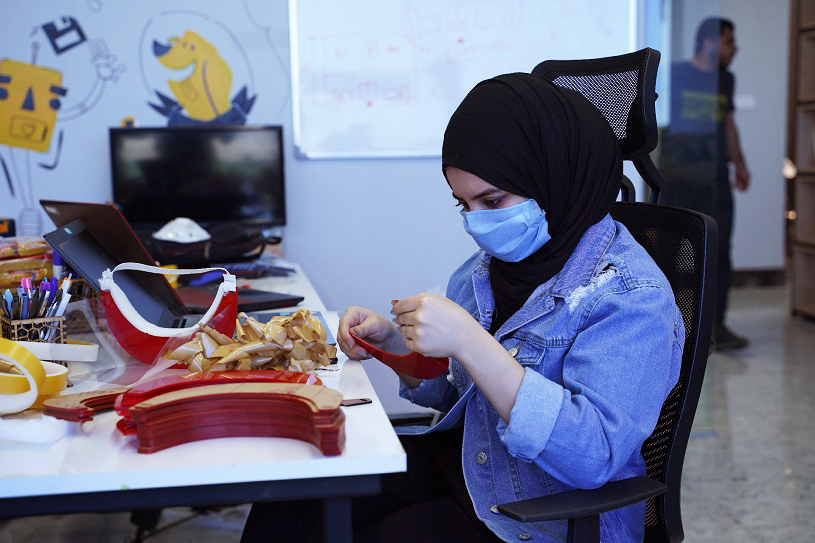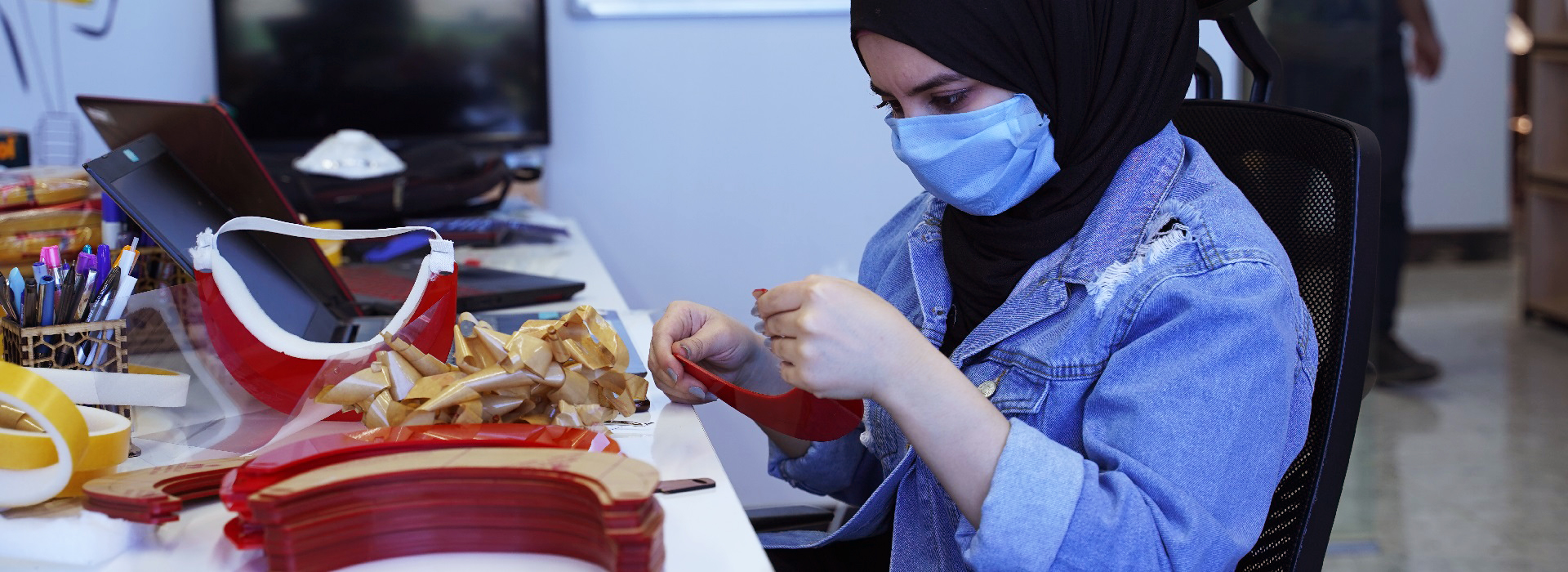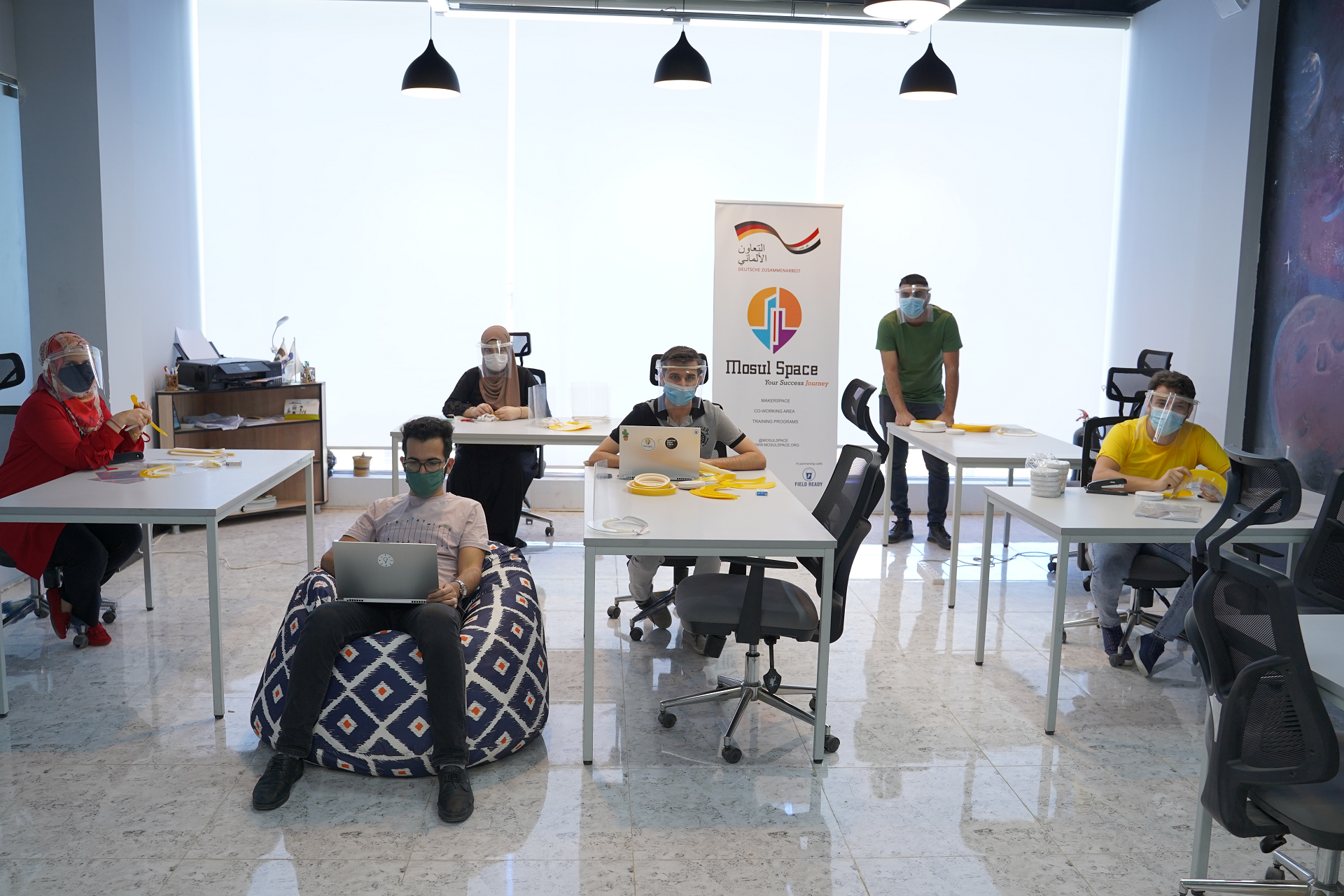

Social Development: Getting through the pandemic with a plan
All around the world, COVID-19 demands flexible and local solutions. In Iraq and Lebanon GIZ is finding these by drawing on structures that are already in place.
The pandemic means unprecedented challenges for many countries. Nevertheless, they can find solutions to some of these in ideas that already exist. In Iraq, for instance, innovation centres are being used to develop medical equipment, while in Lebanon, steps taken to provide digital education are now paying off.
Be it in the health sector, the economy or education, COVID-19 poses wide-ranging challenges. So how can countries continue to function properly despite the pandemic? In many of the countries of assignment for the Deutsche Gesellschaft für Internationale Zusammenarbeit (GIZ) GmbH, governments can draw on existing resources and structures. With a little flexibility, ongoing projects that GIZ is implementing together with its commissioning parties and partners can address new needs. Take Iraq, for example. The closed borders and the general standstill in the movement of goods during the pandemic have made it harder to produce urgently needed medical equipment. However, the country has a network of innovation centres capable of developing creative solutions thanks to their modern technological infrastructure.

Iraq: Creative minds for local solutions
Furnished with state-of-the-art equipment such as 3D printers and laser cutters, teams in the innovation centres of Mosul and Basra – also known as makerspaces – recently developed digital prototypes of protective face shields for medical personnel, and have since manufactured these themselves using the 3D printers. The prototypes were developed in close cooperation with local medical personnel, and their production uses only locally available materials. By the beginning of June, the teams had produced more than 10,000 of these shields. The demand is great as there are a lot of organisations that want to equip their staff with the shields. However, the makerspaces are focused on innovation rather than mass production. Now local, small-scale enterprises are expected to continue production of the protective shields. The makerspaces are already working on new solutions, such as a sensor that will allow hospital staff to operate water taps with their feet, thereby reducing potential contacts with infectious surfaces. For the better regional coordination of supply and demand, institutions and local producers can now use an online platform to register their needs and offer products.
GIZ already began supporting the development of modern technological infrastructure in Iraq in 2018. On behalf of the German Development Ministry (BMZ) it has developed or expanded five innovation centres in the country and equipped them with technological infrastructure. Today, young people meet here and work together to find solutions to problems. At the same time, they use the technical devices available in the makerspaces and develop new ideas and prototypes. More than 5,500 young people have benefited so far from the activities in the innovation centres, while 50 newly formed start-ups use their rooms and training activities.
.jpg)
Lebanon: Digital education founded on good preparation
In Lebanon, too, existing solutions are proving especially valuable during the pandemic. In 2018, a group of former university professors with the non-governmental organisation Lebanese Alternative Learning (LAL) set up Tabshoura, an e-learning platform for schoolchildren. They developed the platform as a supplement to the usual classes in public-sector schools, in order to provide access to education for, among others, refugee children from Syria. Some classes were already being cancelled at the end of 2019 due to political unrest, and since February all schools have been closed because of the coronavirus.
The multilingual platform lets schoolchildren in Lebanon do their classwork at home, and they don't even need an internet connection to do so. Tabshoura, Arabic for ‘chalk’, is one of the few learning platforms whose content has been permitted for use in the state school system in Lebanon. ‘Ours is the most frequently used e-learning platform in Lebanon, because it perfectly matches the structure of the curriculum,’ says LAL's director, Nayla Fahed. The teaching approach places the children at the centre of their learning experience. They develop their own questions and solutions independently, and they get step-by-step feedback. This enables them to build up new knowledge for themselves.
To make sure schoolchildren who live in places without a stable internet connection or electricity supply have the best possible access to the platform, the content is also distributed to schools as ‘Tabshoura in a box’. This is really a minicomputer with inbuilt storage media. Children use the Tabshoura box to transfer learning materials to their own devices, making the content accessible without the need for an internet connection. For children who do not have their own digital devices, a loan system administered by the schools themselves is currently being developed.
On behalf of BMZ and in cooperation with LAL, GIZ is digitising further learning content from the curriculum and formatting the existing content in ways that are as inclusive and barrier-free as possible. The focus is on science subjects, technology and foreign languages, but other content is also being developed that goes beyond the school curriculum. Currently, information on the environment and the economic and social impacts of COVID-19 is under preparation for the platform. 15,000 children and young people already make use of the platform, and more than 500 teachers have received training on how to use Tabshoura. During the pandemic, thanks to Tabshoura schoolchildren can still do their lessons and get ready to sit their exams. Even when the schools reopen, teachers and children alike should continue to benefit from the expansion of the e-learning activities.
As at: June 2020